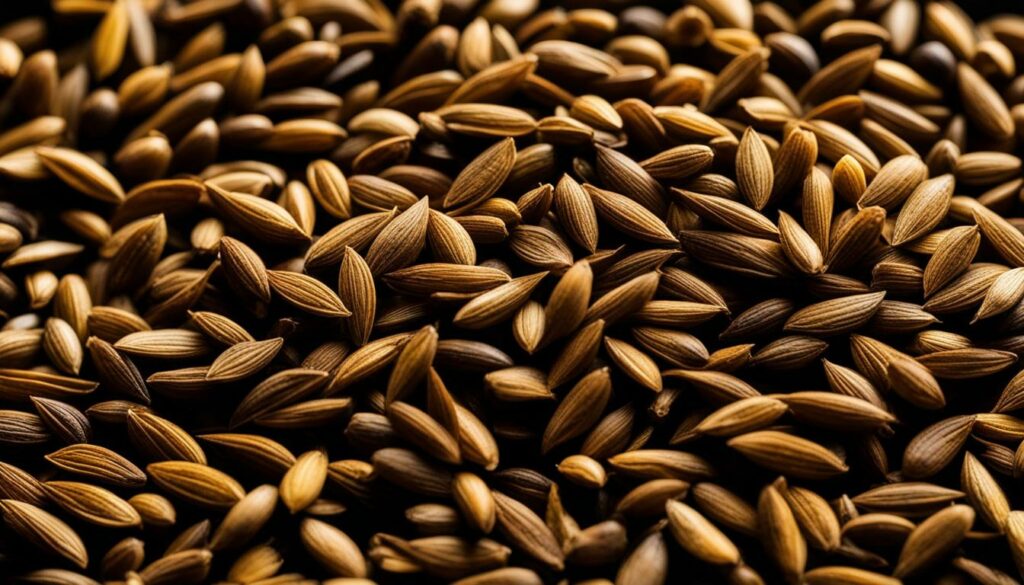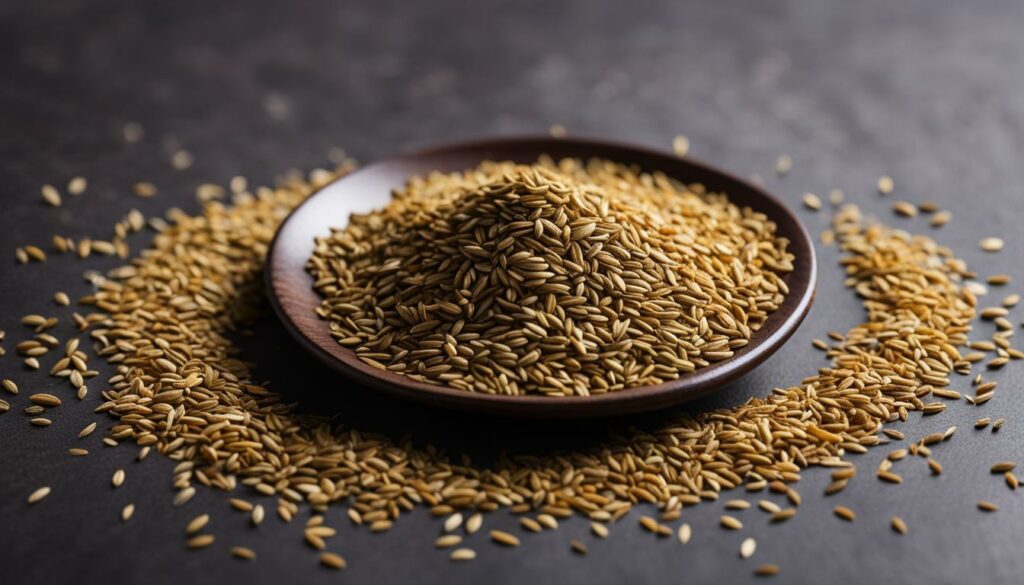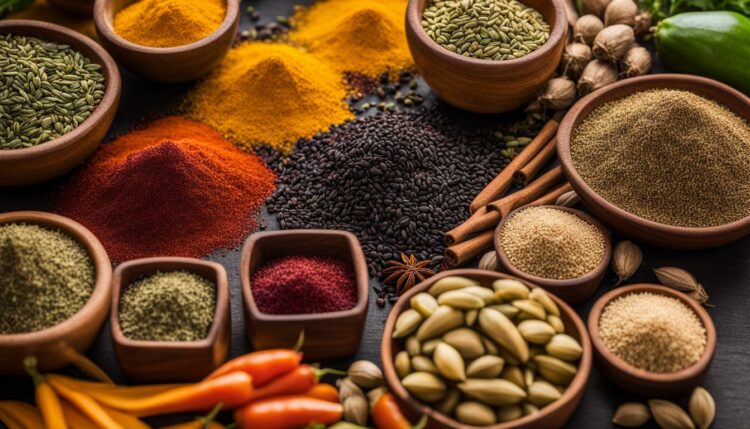Did you know that cumin seeds, commonly used as a flavorful spice, pack a powerful nutritional punch?
These tiny seeds are not just a culinary delight but also offer a range of health benefits that make them a valuable addition to any diet. From aiding digestion to supporting the immune system, cumin seeds have been treasured for their medicinal properties for centuries.
Key Takeaways:
- Cumin seeds are rich in essential vitamins, minerals, and antioxidants.
- They can aid digestion and alleviate symptoms such as bloating and indigestion.
- The antioxidants in cumin seeds help combat oxidative stress and reduce the risk of chronic diseases.
- Cumin seeds support a healthy immune system by providing key vitamins and minerals.
- Research suggests that cumin seeds may aid in weight management by potentially boosting metabolism and reducing appetite.
Digestive Aid
Cumin seeds have long been recognized for their ability to support healthy digestion. These tiny seeds possess carminative properties that can help alleviate common digestive issues such as bloating, indigestion, and gas.
The active compounds found in cumin seeds stimulate the secretion of digestive enzymes, aiding in the breakdown of food and promoting efficient digestion.
When consumed, cumin seeds can provide relief from discomfort caused by bloating by reducing gas production in the digestive tract. The carminative properties of cumin seeds help relax the smooth muscles in the gastrointestinal tract, allowing for smoother transit of food and reducing the likelihood of bloating and discomfort.
In addition, cumin seeds can be particularly beneficial for individuals experiencing indigestion. The natural enzymes present in these seeds assist in breaking down complex food molecules, making it easier for the body to absorb nutrients effectively.
By supporting proper digestion, cumin seeds may help alleviate indigestion and improve overall gastrointestinal health.
It is important to note that while cumin seeds can be a helpful aid for digestion, individuals with underlying digestive conditions should consult with a healthcare professional before incorporating them into their diet.
Antioxidant Properties
Cumin seeds are an abundant source of antioxidants, specifically flavonoids and phenolic compounds.
These powerful antioxidants play a crucial role in combating oxidative stress and reducing the risk of chronic diseases. By neutralizing harmful free radicals in the body, cumin seeds help maintain cellular integrity and promote overall health.
Flavonoids are a diverse group of plant compounds known for their antioxidant properties. They protect the body against oxidative damage caused by environmental factors and aging processes.
Cumin seeds contain an array of flavonoids, including apigenin, luteolin, and quercetin, which contribute to the spice’s potent antioxidant activity.
Phenolic compounds, another group of antioxidants found in cumin seeds, further enhance its health benefits. These compounds, such as caffeic acid, ferulic acid, and rosmarinic acid, possess strong free radical scavenging abilities, neutralizing oxidative species and preventing cellular damage.

Antioxidants in cumin seeds help protect the body from oxidative stress and reduce the risk of chronic diseases.
Immune System Support
Cumin seeds are not only flavorful but also packed with essential vitamins and minerals that can help support a strong immune system. The immune system plays a crucial role in defending the body against infections and illnesses, making it essential to maintain its optimal functioning.
Let’s explore how cumin seeds contribute to immune system support.
One key component of cumin seeds’ immune-boosting properties is their high content of vitamin C. Vitamin C is a powerful antioxidant that helps protect the body against free radicals, which can weaken the immune system. It also stimulates the production of white blood cells, which are vital for fighting off infections.
In addition to vitamin C, cumin seeds are rich in vitamin E. Vitamin E is known for its antioxidant properties and is essential for maintaining healthy immune function. It helps protect immune cells from damage and enhances their ability to defend against harmful pathogens.
Cumin seeds are also a great source of iron and zinc, two minerals that play vital roles in immune system function. Iron is necessary for the production of red blood cells, which transport oxygen to the body’s cells, including immune cells.
Zinc is involved in various immune processes, including the development and function of immune cells.
By incorporating cumin seeds into your diet, you can provide your body with the necessary vitamins and minerals to support a robust immune system.
The Immune-Boosting Nutrients in Cumin Seeds:
| Nutrient | Amount per 100g of Cumin Seeds |
|---|---|
| Vitamin C | 21.2mg |
| Vitamin E | 3.33mg |
| Iron | 66.36mg |
| Zinc | 4.8mg |
It’s important to note that while cumin seeds can support the immune system, they should not replace medical treatments or professional healthcare advice. If you have specific health concerns or conditions, it’s always best to consult with a healthcare professional.
Weight Management
When it comes to managing weight, cumin seeds may offer some promising benefits. Research suggests that incorporating cumin seeds into your diet could potentially contribute to weight loss and management.
One study found that cumin seeds may help boost metabolism, which can increase the number of calories burned by your body. This can be particularly beneficial for individuals aiming to lose weight. Another study indicated that cumin seeds may increase energy expenditure, further supporting weight management efforts.
In addition, cumin seeds have been shown to have appetite-suppressing properties, which can help curb cravings and reduce calorie intake. By reducing appetite, cumin seeds can support a caloric deficit, which is crucial for weight loss.
Adding cumin seeds to your diet is a simple and flavorful way to potentially enhance your weight management journey. However, it’s important to note that cumin seeds alone are not a magical solution for weight loss. They should be incorporated into a balanced diet and healthy lifestyle habits to achieve sustainable results.

Anti-Inflammatory Effects
Cumin seeds have been found to possess compounds with anti-inflammatory properties, making them potentially beneficial for individuals with inflammation-related conditions such as arthritis, asthma, and certain digestive disorders.
Chronic inflammation can contribute to the development and progression of various diseases, including cardiovascular diseases, diabetes, and some forms of cancer.
Incorporating cumin seeds into the diet may help promote a healthier inflammatory response in the body, potentially reducing the risk of these inflammation-related conditions.
Research suggests that cumin seeds contain bioactive compounds that inhibit certain enzymes and signaling molecules involved in the inflammatory process. These compounds may help modulate the body’s immune response and mitigate the production of pro-inflammatory molecules.
While cumin seeds’ anti-inflammatory effects are promising, it’s important to note that they should not be considered a standalone treatment for inflammatory conditions. Consulting a healthcare professional is advised for proper diagnosis, treatment plans, and management strategies.
| Inflammation-Related Conditions | Potential Benefits of Cumin Seeds |
|---|---|
| Arthritis | Cumin seeds may help reduce joint inflammation and alleviate pain associated with arthritis. |
| Asthma | Certain compounds in cumin seeds may have bronchodilatory effects, potentially improving respiratory function in individuals with asthma. |
| Digestive Disorders | Studies suggest that cumin seeds’ anti-inflammatory properties may provide relief from digestive disorders like irritable bowel syndrome (IBS) and ulcerative colitis. |
Conclusion
Incorporating cumin seeds into your diet can provide a range of health benefits. This flavorful spice is a nutritional powerhouse, known for its digestive aid, antioxidant properties, immune system support, potential for weight management, and anti-inflammatory effects.
It’s no wonder that cumin is a popular choice in various cuisines around the world.
By stimulating the secretion of digestive enzymes, cumin seeds help alleviate bloating, indigestion, and gas. The rich antioxidants found in cumin seeds combat oxidative stress and reduce the risk of chronic diseases.
With vitamins and minerals that strengthen the immune system, cumin seeds support overall health and protect against infections and illnesses.
If you’re looking to manage your weight, cumin seeds might be a helpful addition to your diet. Some studies suggest that they can boost metabolism, increase energy expenditure, and reduce appetite.
Additionally, the anti-inflammatory effects of cumin seeds offer potential relief from inflammation-related conditions like arthritis and asthma.
Remember, moderation is key when incorporating any dietary addition. It’s always advisable to consult with a healthcare professional for personalized advice regarding specific health concerns or conditions. So, why not add a sprinkle of cumin seeds to your dishes and enjoy the flavorful health benefits they have to offer?
FAQ
What are the health benefits of cumin?
Cumin offers a range of health benefits, including aiding digestion, combating oxidative stress, supporting the immune system, potentially aiding in weight management, and offering anti-inflammatory effects.
How can cumin seeds aid digestion?
Cumin seeds possess carminative properties that can help alleviate bloating, indigestion, and gas. They stimulate the secretion of digestive enzymes, promoting efficient digestion and nutrient absorption.
What are the antioxidant properties of cumin seeds?
Cumin seeds are rich in antioxidants like flavonoids and phenolic compounds. These antioxidants help combat oxidative stress and reduce the risk of chronic diseases by neutralizing harmful free radicals in the body.
How does cumin support the immune system?
Cumin seeds contain vitamins C and E, iron, and zinc, all of which contribute to a strengthened immune system. These nutrients support immune function and help the body defend against infections and illnesses.
Can cumin seeds aid in weight management?
Some studies suggest that cumin seeds may aid in weight loss and management. They potentially boost metabolism, increase energy expenditure, and reduce appetite, making them a valuable addition to a weight management diet.
What are the anti-inflammatory effects of cumin seeds?
Cumin seeds contain compounds with anti-inflammatory properties, offering potential relief from inflammation-related conditions such as arthritis, asthma, and certain digestive disorders. Incorporating cumin seeds into the diet may promote a healthier inflammatory response in the body.
Should I consult a healthcare professional before incorporating cumin into my diet?
As with any dietary addition, it is advisable to consult a healthcare professional for specific health concerns or conditions.




